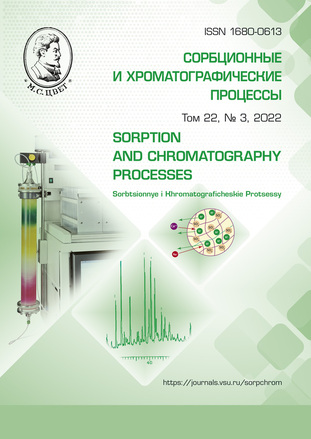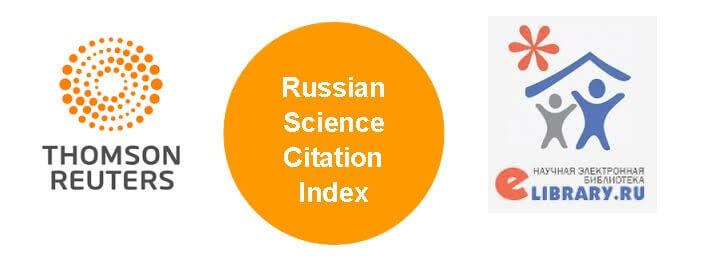Development of a method for the sorption immobilization of bromelain on N-maleoylchitosan and the study of the structural features of the obtained complex
Abstract
Bromelain is a proteolytic enzyme that has found application in medicine and industry. However, the use of free forms of enzymes has its drawbacks, such as their instability to changing environmental conditions, labor intensity and complexity of separation from the initial reagents and reaction products after the completion of the process. This problem can be solved by immobilizing bromelain on polysaccharides.
In connection with the above, the aim of the study was to develop a technique for the sorption immobilization of bromelain on N-maleoylchitosan with different molecular weights and to study the structural features of the resulting complexes.
The synthesis of N-maleoylchitosan with different molecular weights and degrees of substitution was carried out. A technique for carrying out sorption immobilization of bromelain on N-maleoylchitosan has been proposed. The interaction between the carrier and the enzyme was studied by IR spectroscopy and flexible molecular docking, the functional groups of the polysaccharide and amino acids of the surface of bromelain globules involved in the formation of the complex were identified. The protein content in the immobilized preparations of bromelain was measured by the modified Lowry method; the protease activity of the samples was determined on the azocasein as substrate.
It is shown that the interaction of bromelain and N-maleoylchitosan is due to electrostatic and hydrophobic interactions, as well as the formation of hydrogen bonds between the components. Bonds and interactions with N-maleoylchitosan are formed, among other things, with the participation of amino acid residues that make up the active cite of the enzyme (Cys26 and His158), which affects the proteolytic activity of the samples obtained.
It has been established that the optimal ratio of protein content (mg per g of carrier), total activity (in units per ml of solution) and specific activity (in units per mg of protein) is achieved when N-maleoylchitosan with a molecular weight of 200 kDa is used as a carrier matrix. .
The resulting preparations of bromelain immobilized on N-maleoylchitosan can become the basis for solving a number of problems in biomedicine that arise when creating preparations of bactericidal, decongestant, antithrombic, and antiviral effects. Due to the combination of relatively inexpensive components, the method proposed by us is available for Russian laboratories and is promising for further application in industry.
Downloads
References
Sougata J., Subrata J. Functional Biomaterials. Springer. Singapore. 2022. 522 р.
Holyavka M., Faizullin Dzh., Koroleva V., Olshannikova S., Zakhartchenko N., Zuev Yu., Kondratyev M., Zakharova E., Artyukhov V. Novel bio-technological formulations of cysteine proteases, immobilized on chitosan. Structure, stability and activity. Int. J. Biol. Macromol. 2021; 180: 161-176. https://doi.org/10.1016/j.ijbiomac.2021.03.016
Saha I., Rai V.K. Hyaluronic acid based microneedle array: Recent applications in drug delivery and cosmetology. Carbohyd.Polym. 2021; 267(118168): 14. https://doi.org/10.1016/j.carbpol.2021.118168
Huang Yu., Yu H., Wang L., Shen D., Ni Z., Ren Sh., Lu Ya., Chen X., Yang J., Hong Y. Research progress on cosmetic microneedle systems: Preparation, property and application. Eur. Polym. J. 2022; 163: 110942. https://doi.org/10.1016/j.eurpolymj.2021.110942
Slivkin D.A., Lapenko V.L., Safono-va O.A., Suslina S.N., Belenova A.S. Khitozan dlya farmatsii i medicyny (Chitosan for pharmacy and medicine). Vestnik VGU. Khimiya. Biologiya. Farmaciya. 2011; 2: 211-232. (in Russ.)
Varlamov V.P., Mysyakina I.S. Chi-tosan in biology, microbiology, medicine, and agriculture. Мicrobiology. 2018; 87(5): 712-715.
Hu B., Guo Yu., Li H., Liu X., Fu Yu., Ding F. Recent advances in chitosan-based layer-by-layer biomaterials and their biomedical applications. Carbohyd. Polym. 2021; 271; 118427. https://doi.org/10.1016/j.carbpol.2021.118427
Kou Sh., Peters L., Mucalo M. Chi-tosan: A review of molecular structure, bioactivities and interactions with the human body and micro-organisms. Carbohyd. Polym. 2022; 282: 119132. https://doi.org/10.1016/j.carbpol.2022.119132
Yu N., Li Yu., Wang Ya., Xu H., Ye F., Fu Q. Healing effect of carboxymethyl chitosan-plantamajoside hydrogel on burn wound skin. Burns. 2022; 48(4): 902-914 https://doi.org/10.1016/j.burns.2022.01.019
Wei Q., Wang Ya., Wang H. et al. Photoinduced adhesive carboxymethyl chitosan-based hydrogels with antibacterial and antioxidant properties for accelerating wound healing. Carbohyd. Polym. 2022; 278: 119000. https://doi.org/10.1016/j.carbpol.2021.119000
Ding Y., Liu D., Luo D., Sun X., Mei J., Wang Sh., Li Zh. Colloids and Sur-faces A: Physicochemical and Engineering Aspects. Colloid Surf A: Physicochem Engin Aspects. 2022; 2022: 128576. https://doi.org/10.1016/j.colsurfa.2022.128576
Liu X., Xue F., Li Ch., Adhikari B. Physicochemical properties of films pro-duced using nanoemulsions stabilized by carboxymethyl chitosan-peptide conjugates and application in blueberry preservation. Int. J. Biol. Macromol. 2022; 202: 26-36. https://doi.org/10.1016/j.ijbiomac.2021.12.186
Long Y., Hu Sh., Lei P., Li Y. Preparation of green silver nanoparticles with high antibacterial ability using N-maleoylchitosan and montmorillonite. Mat Lett. 2022; 316: 132044. https://doi.org/10.1016/j.matlet.2022.132044
Hou X., Zhang W., He M., Lu Y., Lou K., Gao F. Preparation and characterization of β-cyclodextrin grafted N-maleoyl chitosan nanoparticles for drug delivery. Asian J. Pharm. Sci. 2017; 12(6): 558-568. https://doi.org/10.1016/j.ajps.2017.07.007
Zhu A., Pan Y., Liao T., Zhao F., Chen T. The synthesis and characterization of polymerizable and biocompatible N-maleic acylchitosan. J. Biomed. Mat. Res. B: Appl. Biomat. 2008; 85B (2): 489-495. https://doi.org/10.1002/jbm.b.30970
Sorokin A., Lavlinskaya M. Synthe-sis of the superabsobents enriched in chi-tosan derivatives with excellent water absorption properties. Polym. Bull. 2022; 79: 407-427. https://doi.org/10.1007/s00289-020-03521-9
Salvesen G.S., Hempel A., Coll N.S. Protease signaling in animal and plant-regulated cell death. FEBS J. 2015; 283(14): 2577-2598. https://doi.org/10.1111/febs.13616
Ol’shannikova S.S., Red’ko Yu.A., Lavlinskaya M.S., Sorokin A.V., Holyavka M.G., Artyukhov V.G. Preparation of Papa-in Complexes with Chitosan Microparticles and Evaluation of Their Stability Using the Enzyme Activity Level. Pharm. Chem. J. 2022; 55: 1240-1244. https://doi.org/10.1007/s11094-022-02564-8
Hikisz P., Bernasinska-Slomczewska J. Beneficial Properties of Bromelain. Nutrients. 2021; 13: 4313. https://doi.org/10.3390/nu13124313
Baidamshina D.R., Koroleva V.A., Trizna E.Yu., Pankova S.M., Agafonova M.N., Chirkova M.N., Vasileva O.S., Akhmetov N., Shubina V.V., Porfiryev A.G., Semenova E.V., Sachenkov O.A., Bogachev M.I., Artyukhov V.G., Baltina T.V., Holyavka M.G., Kayumova A.R. An-ti-biofilm and wound-healing activity of chitosan-immobilized Ficin. Int. J. Biol. Macromol. 2020; 164: 4205-4217. https://doi.org/10.1016/j.ijbiomac.2020.09.030
Holyavka M., Pankova S., Koroleva V. Vyshkvorkina Yu., Lukin A., Kon-dratyev M., Artyukhov V. Influence of UV radiation on molecular structure and catalyt-ic activity of free and immobilized bromelain, ficin and papain. J. Photochem. Photo-biol. B: Biol. 2019; 201: 111681. https://doi.org/10.1016/j.jphotobiol.2019.111681
Arefin P., Habib Sh., Arefin A., Arefin S. A review of clinical uses of Bro-melain and concerned purification methods to obtain its pharmacological effects efficiently. Int. J. Pharm. Res. 2020; 1: 469-478. https://doi.org/10.31838/ijpr/2020.SP1.066
Owoyele B.V., Bakare A.O., Ologe M.O. Review Article Bromelain: A Review of its Potential as a Therapy for the Man-agement of Covid-19, Niger. J. Physiol. Sci. 2020; 35: 10-19.
Kasaai M.R. Calculation of Mark-Houwink-Sakurada (MHS) equation viscometric constants for chitosan in any solvent-temperature system using experimental reported viscometric constants data. Carbo-hyd. Polym. 2007; 68: 477-488. https://doi.org/10.1016/j.carbpol.2006.11.006
Lowry О.H., Rosebrough N.J., Faar A.L., Randall R.J. Protein measurement with the folin phenol reagent. J. Biol. Chem. 1951; 193: 265-275. https://doi.org/10.1016/S0021-9258(19)52451-6
Sabirova A.R., Rudakova N.L., Balaban N.P., Ilyinskaya O.N., Demidyuk I.V., Kostrov S.V., Rudenskaya G.N., Sharipova M.R. A novel secreted metzincin metalloproteinase from Bacillus intermedi-us. FEBS Lett. 2010; 584 (21): 4419-4425. https://doi.org/10.1016/j.febslet.2010.09.049
Glazunov V.P., Odinokov S.Е. IK-spektroskopicheskoe opredelenie stepeni atsetilirovaniya khitina (Determination of the Chitin Degree of Acetylation by IR spectroscopy), Bioorganicheskaya Khimiya. 1995; 21(11): 881-884. (in Russ.)
Lunkov A., Shagdarova B., Lyalina T., Dubinnyi M.A., Karpova N., Lopatin S., Il’ina A., Varlamov V. Simple method for ultrasound assisted «click» modification of azido-chitosan derivatives by CuAAC. Carbohyd. Polym. 2022; 282: 119109. https://doi.org/10.1016/j.carbpol.2022.119109







